Making money as a sound engineer comes down to involving yourself in your local music community, forming connections, knowing your stuff, and being reliable. There are many ways to make money as a sound engineer; I advise being open to different kinds of work.
Making Money As A Sound/Audio Engineer

Making money as an audio engineer can be challenging, especially if you are new to audio production. Finding work can be tricky if you do not have a solid plan or an idea of where to look.
After cutting my teeth in several facets of my local music community and spending years learning the craft of sound/audio engineering,
I’m finally at a point where I have multiple consistently paying audio gigs.
In this in-depth article, we’ll first dive in and see how to make money as an audio engineer. After that, I’ll share some epic tips on how to find sound-engineering work.
What Jobs Can You Get As A Sound Engineer?
Let’s look at some of the different jobs you might get as a sound engineer.
Roadie
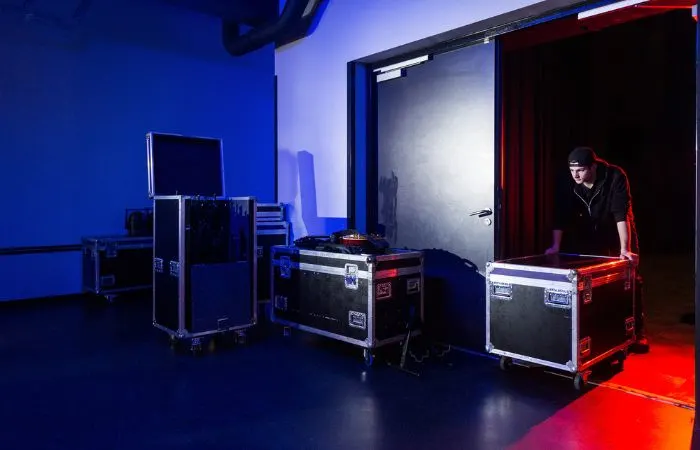
The first type of audio work I want to discuss is some of the most accessible work to find if you’re starting.
Being a roadie entails hauling gear, setting up equipment, and doing some of the heavy lifting involved with live music.
Roadie work is not the most glamorous role in the industry, but it is a great way to get your foot in the door and start making connections.
Live Sound Engineer

The next job within the audio industry that I want to talk about is the position of live sound engineer.
This involves running sound at live concerts in real-time to help the talent sound as good as possible.
Finding work as a live sound engineer may take some time because you have to form relationships and find artists who trust and enjoy working with you. But it is well worth it!
Working gigs can be one of the more enjoyable types of work within the audio industry.
Studio Technician/Assistant Engineer
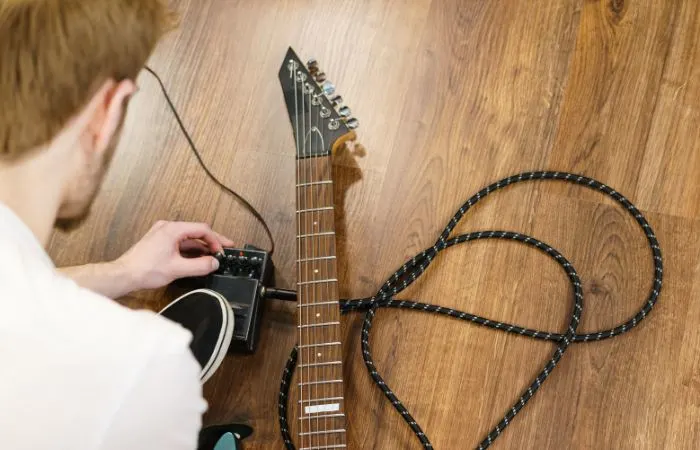
A studio technician/assistant engineer works in a recording or broadcast studio and helps set up and operate audio gear to ensure a smooth session.
Their primary job is to assist the producer/head engineer in any given session with whatever they might need.
A studio technician might not be the top dog in a studio session, but they have their foot in the door and are moving towards building a career in audio.
Producer/Recording Engineer

The producer/recording engineer steers the ship during a recording or production session. They are responsible for ensuring the session is smooth and productive and contributing creatively if they are in a producer role.
This position will undoubtedly take some time for you to attain unless you have your own studio because it requires a ton of knowledge and trust in your abilities.
Mixing Engineer
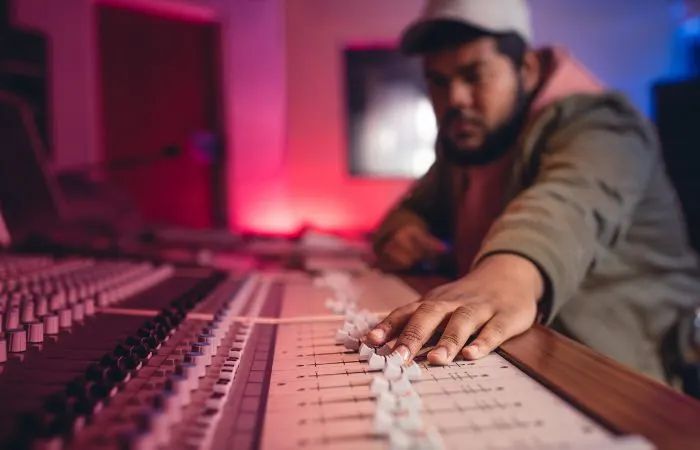
The next type of work within the audio industry is that of a mixing engineer.
A mixing engineer is a person who receives the raw audio files from a recording/music production session and puts in the work to polish and process them into a final mix.
This is another job that will definitely take some time to get because it takes a lot of know-how and skill that is only earned over time.
Mastering Engineer
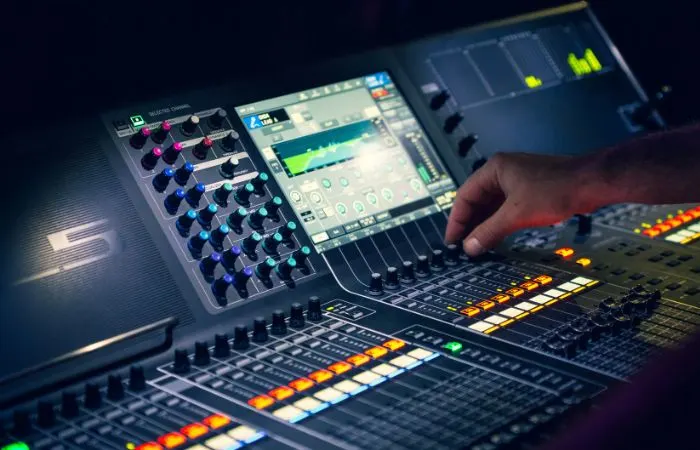
A mastering engineer is the one who takes the final approved mix and does work to get it to a professional and releasable level.
Because mastering is more challenging than just making a track louder (like some people may think), this position is also not easily attained.
It requires a skill set from other positions within the audio industry.
Sound Designer
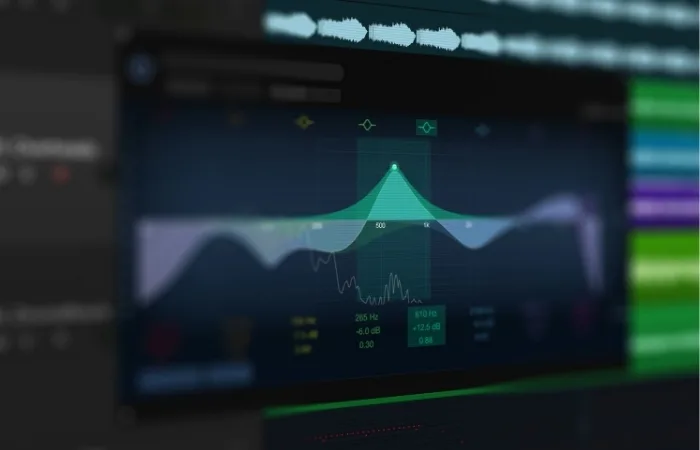
A sound designer creates and coordinates sounds for various projects such as music production, video game audio, movie/television audio, etc.
A sound designer is a very broad job title. Because it requires such a vast understanding of audio/sound, it has many different practical applications.
Foley Artist

The last job within sound engineering that I want to go over is the position of a foley artist.
Foley describes the everyday and natural sounds we hear in film, TV, and other projects, such as footsteps, clothing noises, branches breaking, weapon noises, or any other sound you can imagine.
A foley artist works in a recording studio to create and arrange these sounds over a production.
This is a specialized area within audio, but it can be perfect for the right person.
As you can see, there are many different types of work in the world of sound/audio.
Keep in mind having a degree in audio is optional for these jobs, but having one will help when trying to step into some of the higher-level positions mentioned here.
How To Find Sound Engineer Jobs

Using The Internet To Find Gigs
Nowadays, the internet will be one of your best friends when finding audio-related work.
Here are some ways to help you research and pursue opportunities within the audio industry:
- Indeed/LinkedIn/ZipRecruiter/SimplyHired – Always give the standard job search engines a try when looking for work in the sound engineering field.
- CraigsList – Although it might not be as popular as it once was, CraigsList can still be a great place to look for and apply for audio jobs.
- UpWork – UpWork is an excellent website for finding music production and sound engineering jobs. I’ve had some great success with it myself!
- Facebook/Instagram – Some of the best opportunities I’ve gotten within the audio industry have come from simply reaching out to people on various social media outlets asking for work. Remember, fortune favors the bold, so don’t be afraid to send that DM. Just be respectful about it and try not to bug anyone!
These are some of my favorite internet resources when looking for work in the audio industry. Remember that any website that allows you to connect with others is also a valid option.
It’s vital to utilize all available resources when looking for opportunities, so don’t put all your eggs in one basket!
Forming and Making The Most Out Of Valuable Connections
I cannot stress just how important this next one is!
I would say that 80% of the audio work I have found comes from knowing people and the connections I have made within the music/audio community.
Forming and making the most out of connections with people in the audio industry is one of the best ways to learn about and attain other opportunities and gigs.
This is one of the reasons you must conduct yourself professionally while working and are also pleasant to work with.
Finding work within any creative industry without having, forming, or nurturing connections and relationships is going to be almost impossible! Don’t be afraid to come out of your shell and introduce yourself to people and potential clients in the music scene.
Keeping An Open Mind
This next tip has led me to a lot of unexpected but fantastic work in audio and music production.
It’s not easy to go to the top of any given industry, and the same is valid for audio, so be patient and open to opportunities you did not expect!
What Do You Need To Become A Sound Engineer?

There are no specific requirements for becoming a sound engineer as there would be for a doctor or other high-level career.
Becoming a sound engineer is less about technical milestones or an official education and more about getting started and working your way up.
You can build a career in audio no matter where you come from if you are willing to work hard, stay focused on your goals, and constantly learn new things about the craft.
A degree in audio engineering can definitely help you stand out from other individuals in the industry. Also, some higher-level gigs might only be looking to hire someone with a degree.
Learning Your Stuff
Before starting to work in the audio industry, you must at least know a thing or two, including:
- Hauling gear, setting up/operating audio equipment
- The way a live show or studio session runs (depending on which area of the industry you are working in)
- How to work effectively within your given role
You can learn these things by involving yourself in the live music/studio setting over time or by going to school for a degree in audio.
The internet is also a great place to learn things such as mixing tips, gear tutorials, etc. (be sure you use only reliable sources)!
Many aspects of working in the audio industry, such as how to conduct yourself professionally, appropriately interact with clients or work towards taking a more senior role, whether in the live music or studio setting.
These are best learned on the job as you progress. Still, you might have difficulty finding audio work without an initial base of knowledge/expertise.
The more you can learn about audio and sound engineering, the more prepared you will be to work in the audio industry!
Check out this article on how to survive in the music industry.
Sound Engineer Side Hustles – 5 Ways To Make Money As A Sound Engineer

Let’s look at other ways to make some side income as a sound engineer.
Producing Audio Related Content For a Website/Social Media Outlet
One great way to earn extra income as a sound engineer is to find a website or social media outlet to create content, such as articles and tutorial videos.
It might not be your end-all-be-all in the audio industry. Still, it can help you get extra spending money in your pocket while learning more about your craft.
Running Sound At Low-Level Gigs For Friends and Family
Does your Uncle Tony need someone to run sound or do some basic DJing at a family function/party? It sounds like an excellent opportunity to put your name in the hat to earn a few extra bucks.
Providing Consultation For Audio/Sound Beginners
Another way to earn money as a sound engineer is to provide beginners mixing and music production consultations. Your expertise could help a newbie create a much better-sounding track!
Recording Home Demos/EPs For Artists In Your Area
Even if you do not have a proper recording studio, you should consider having a half-decent set of recording gear (audio interface, microphones, etc.) that you can use to record demos or first EPs for bands/artists in your area.
It might not be the best quality at first, but that’s different from what some people look for when first starting out.
Besides, you can still attain great results if you pay attention and do what you can with your given constraints.
Renting Basic Equipment For Smaller Functions
My last sound engineer side hustle that I want to cover is renting out essential equipment to people that might need it for parties or small functions.
For example, if you invest in a half-decent PA system, you can earn money by renting it out.
How Much Money Do Sound Engineers Make?
The average salary of a working sound engineer is between $50,000-$55,000 a year. However, the top 10% of earners in the industry make something closer to $90,000-$100,000 a year, and the bottom 10% make around $25,000-$30,000.
Keep in mind your income as a sound engineer will depend on many things, such as your skill level, your education, where you live, who you work for, what part of the industry you’re in, and more.
What Is The Starting Salary For A Sound Engineer?
For the starting sound engineer salary in the United States, you can expect around $25,000-$45,000, but this will depend on quite a few factors.
Is Audio Engineering A Good Career?
Audio engineering is not the right career path for everyone, but it is a great industry for the right people.
For example, If you have no interest or passion for audio engineering and are just looking into new career fields, I would not recommend stepping into the world of audio.
It has quite the learning curve and is not the easiest industry to break into if you are entirely new to it.
However, if you are interested in and involved with music and audio and feel passionate about it, audio engineering might be perfect for you!
You get to envelope yourself in a musical environment where you apply skills and techniques you have learned while doing what you love.
Although breaking into the audio industry can be difficult, it is a great career path for those passionate about and ready to commit themselves to music and audio.
How To Make Money With A Recording Studio?
To make money with a recording studio, you can do things such as…
- Host recording sessions for bands/artists
- Offer mixing and mastering services
- Produce tracks for artists
- Offer the space for the filming/recording intimate concerts/live streams.
- Rent out the space for others to use
My main tip for making money with a recording studio is to be active in your local music community and stay on top of marketing/advertising.
You won’t make any money from operating a studio if no one knows it exists!
Related Questions
How Long Does It Take Until You Are Making A Living As A Sound Engineer?
Although it varies person by person, it can take two to seven years to begin making a decent living as a sound engineer.
It all depends on who you know, what you know, where you learned it, where you live, and more. The best way to build a career in audio is to be easy to work with and open to different industry paths.
What Types Of Venues Can A Beginner Sound Engineer Expect To Work At?
The beauty of working in audio is that depending on the gig; you never know where you might end up working.
For example, in the last month, I have worked at a cigar fest, two’ pinkies up’ weddings, a bowling alley, and two diver bars, all with the same act! Although some venues will be nicer than others, you definitely get a wide variety of working environments in the world of audio.
How Much Will A Beginner Sound Engineer Make Per Each Gig?
If you start working in sound engineering, you will make significantly less than a seasoned sound/audio engineer.
When you first start in the industry, you will likely be doing roadie work, such as hauling and setting up sound equipment, running cables, etc. This is a great way into the industry to gain experience and form working relationships. Still, it won’t be the highest pay.
A beginner in sound engineering will likely make between $20-$30 hourly. Therefore, depending on the length of the gig that you are working, you can expect to make anywhere from $100-$350 per show. Of course, this depends on quite a few factors.
Final Words
As I have shown you, there are many ways to make money as a sound engineer and numerous ways into the industry.
The best way to start making money as a sound engineer is to be open to many different types of audio work, be someone easy to work with, and put time into involving yourself with your local music community to form working relationships/seek out gigs.
Although everyone’s journey into the world of audio/sound engineering will look different, rest assured that you can also build a career in audio if you are hardworking and reliable!
Check out this guide on how to make money from music production.

 Want to connect with other music producers for help and guidance?
Want to connect with other music producers for help and guidance?